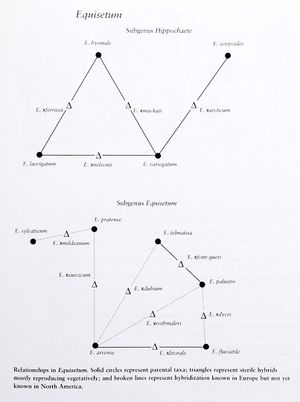Difference between revisions of "Equisetum subg. Hippochaete"
Handb. Fern-Allies 3. 1887.
Common names: Scouring rush
Basionym: Undefined subg. Hippochaete J.Milde Bot. Zeitung (Berlin) 23: 297. 1865
Treatment appears in FNA Volume 2.
FNA>Volume Importer |
imported>Volume Importer |
||
| (6 intermediate revisions by 2 users not shown) | |||
| Line 8: | Line 8: | ||
}} | }} | ||
|common_names=Scouring rush | |common_names=Scouring rush | ||
| − | |basionyms={{Treatment/ID/ | + | |basionyms={{Treatment/ID/Basionym |
|name=Undefined subg. Hippochaete | |name=Undefined subg. Hippochaete | ||
|authority=J.Milde | |authority=J.Milde | ||
| + | |rank=subgenus | ||
| + | |publication_title=Bot. Zeitung (Berlin) | ||
| + | |publication_place=23: 297. 1865 | ||
}} | }} | ||
|synonyms= | |synonyms= | ||
| Line 20: | Line 23: | ||
}}<!-- | }}<!-- | ||
| − | --><span class="statement" id="st-undefined" data-properties=""><b>Aerial </b>stems persisting more than a year (except Equisetum laevigatum), with sunken stomates in single lines on each side of stem valleys; branches generally lacking or few (except E. ramosissimum). <b>Cones</b> sharply pointed at apex (except E. laevigatum).</span><!-- | + | --><span class="statement" id="st-undefined" data-properties=""><b>Aerial </b>stems persisting more than a year (except <i>Equisetum laevigatum</i>), with sunken stomates in single lines on each side of stem valleys; branches generally lacking or few (except <i>E. ramosissimum</i>). <b>Cones</b> sharply pointed at apex (except <i>E. laevigatum</i>).</span><!-- |
-->{{Treatment/Body | -->{{Treatment/Body | ||
|distribution=Nearly worldwide. | |distribution=Nearly worldwide. | ||
| − | |discussion=<p>The only species of this subgenus in the flora that is regularly branched, bearing several branches per midstem node, is Equisetum ramosissimum. The others, though normally unbranched, with age or injury may develop one or a few branches, usually from the proximal or most distal nodes.</p><!-- | + | |discussion=<p>The only species of this subgenus in the flora that is regularly branched, bearing several branches per midstem node, is <i>Equisetum ramosissimum</i>. The others, though normally unbranched, with age or injury may develop one or a few branches, usually from the proximal or most distal nodes.</p><!-- |
--><p>Species 7 (5 in the flora).</p> | --><p>Species 7 (5 in the flora).</p> | ||
|tables= | |tables= | ||
| Line 37: | Line 40: | ||
-->{{#Taxon: | -->{{#Taxon: | ||
name=Equisetum subg. Hippochaete | name=Equisetum subg. Hippochaete | ||
| − | |||
|authority=(J. Milde) Baker | |authority=(J. Milde) Baker | ||
|rank=subgenus | |rank=subgenus | ||
| Line 49: | Line 51: | ||
|publication year=1887 | |publication year=1887 | ||
|special status= | |special status= | ||
| − | |source xml=https:// | + | |source xml=https://bitbucket.org/aafc-mbb/fna-data-curation/src/2e0870ddd59836b60bcf96646a41e87ea5a5943a/coarse_grained_fna_xml/V2/V2_147.xml |
|genus=Equisetum | |genus=Equisetum | ||
|subgenus=Equisetum subg. Hippochaete | |subgenus=Equisetum subg. Hippochaete | ||
Latest revision as of 21:21, 5 November 2020
Aerial stems persisting more than a year (except Equisetum laevigatum), with sunken stomates in single lines on each side of stem valleys; branches generally lacking or few (except E. ramosissimum). Cones sharply pointed at apex (except E. laevigatum).
Distribution
Nearly worldwide.
Discussion
The only species of this subgenus in the flora that is regularly branched, bearing several branches per midstem node, is Equisetum ramosissimum. The others, though normally unbranched, with age or injury may develop one or a few branches, usually from the proximal or most distal nodes.
Species 7 (5 in the flora).
